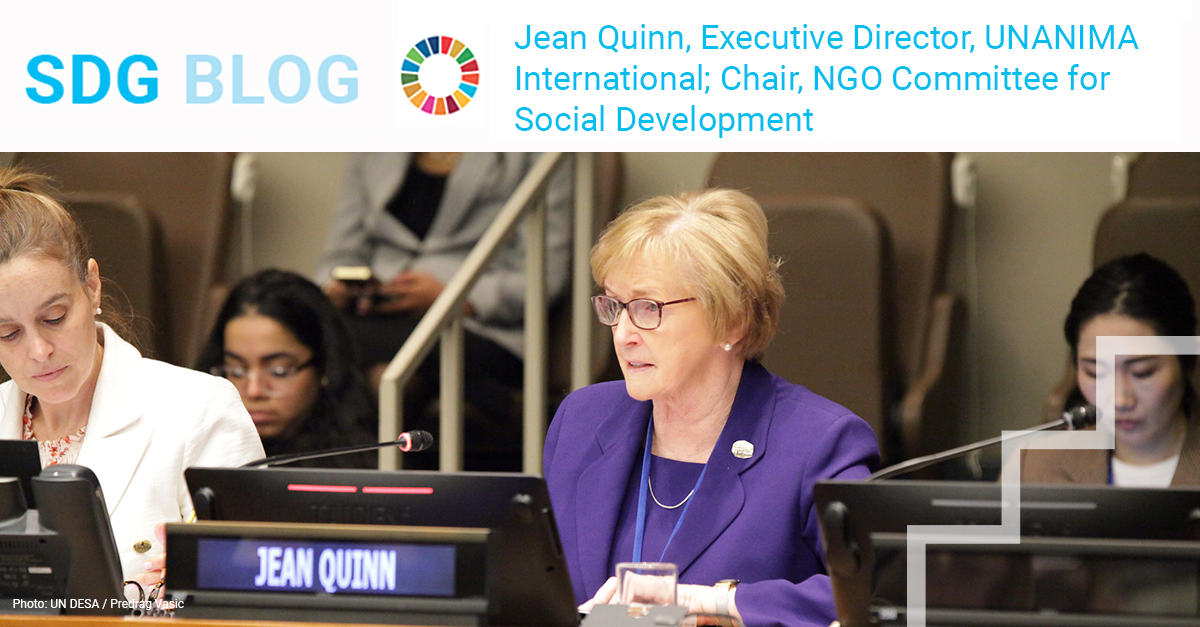SDG Blog

Marginalized communities are not voiceless; it is time for us to listen
By Jean Quinn, Executive Director, UNANIMA International; Chair, NGO Committee for Social Development
When I came to the UN eight years ago, I was overwhelmed by the extent of the issues presented to me. However, I knew almost immediately that I was in the right place at the right time. The UN is a vastly different landscape to where I come from in the West of Ireland. Yet I went towards it with an open heart, a reverence, and receptive to what it was going to reveal to me. All of us—whether UN Personnel, Member States, or NGOs— are involved in the construction of a new world. For me, partnerships and collaboration are key to our success. As members of international organizations, we have a significant role to play in the reduction of inequality and the implementation of the United Nations 2030 Agenda for Sustainable Development. This role must be undertaken with shared responsibility, cooperation, dignity, and respect.
Each year the Commission for Social Development focuses on fostering social justice and the social perspective of development. It necessitates the inclusion of Civil Society and grassroots organizations in the deliberations, and in turn Civil Society is highly engaged in the work of the Commission. For me, this has been evidenced at the Civil Society Forum, hosted annually at the UN Headquarters by the NGO Committee for Social Development (NGO CSocD), and also by the increased opportunities for nongovernmental organizations to host side events and present remarks at meetings.
As Chair of the NGO CSocD, I have presented the Civil Society Declaration at the Opening of the Commission for the past two years and have had numerous opportunities to raise the experiences of grassroots communities. In the words of the Permanent Representative of Ireland to the UN, Ambassador Fergal Mythen, during his remarks at this year’s Civil Society Forum, “CSocD is a special time at the UN because the doors open to Civil Society and the energy rushes into the room with you… it’s really important that we keep that space open for all of you, where we can work together, challenge each other, and make this world a better place.”
The CSocD is certainly one of the busiest and most engaging times for our committee and as Civil Society representatives here at the UN. Ahead of the CSocD, we meet with Member States to discuss advocacy priorities and share about our work. I love the fact that when we meet, we witness each other’s gifts and bring them out, and in turn they provide an incredible gift to those left behind in our world.
Civil Society works year-round to advance social justice and promote inclusive societies that leave no one behind. We attend a wide variety of UN Summits, Conferences, and Commissions to share the insights gained through our advocacy and research with grassroots communities. There are numerous NGO Committees on issues like migration, climate, the status of women, and sustainable financing. We as Civil Society intimately understand that social, political, environmental, economic, and cultural issues are interconnected, and we have developed and advocated for holistic approaches which confront the unique realities of vulnerable populations worldwide. We collaborate with a variety of stakeholders and stand ready to complement and help shape state efforts at every level.
Unfortunately, the space for Civil Society at the UN often feels like it is shrinking, despite recognition of the value of Civil Society inclusion in the room where policy decisions are made. The work of Civil Society should be more visible in all UN processes, not just during the CSocD. The inclusion of grassroots communities also needs to be more systematically integrated. As I often say, it is not that marginalized communities are voiceless, it is that no one is listening to their voices.
We have 6 years left to achieve the ambitious goals outlined in the 2030 Agenda. This CSocD in many ways represented a stock take of progress on the Sustainable Development Goals and the commitments of the Copenhagen Declaration which informed them. In every aspect we as an international community are off track from meeting those goals. A theme that came up repeatedly throughout CSocD62 was that we at the UN have already developed the framework to address the global challenges of today, as outlined in the 2030 Agenda. However, we struggle to reach consensus on the implementation of that framework.
Despite the many multifaceted challenges facing the UN today, there is reason for hope too. Member State partnership and cooperation with Civil Society was high this year ahead of and during the Commission, indicating promising signs of a renewed commitment to multilateralism and more inclusive policymaking. Through collaboration between Member States, Civil Society, and other stakeholders across the globe, we can accelerate progress on the SDGs and continue to forge a path towards a more just, sustainable, and transparent system at every level.
* The views expressed in this blog are the author’s and do not necessarily reflect the opinion of UN DESA.
 Welcome to the United Nations
Welcome to the United Nations